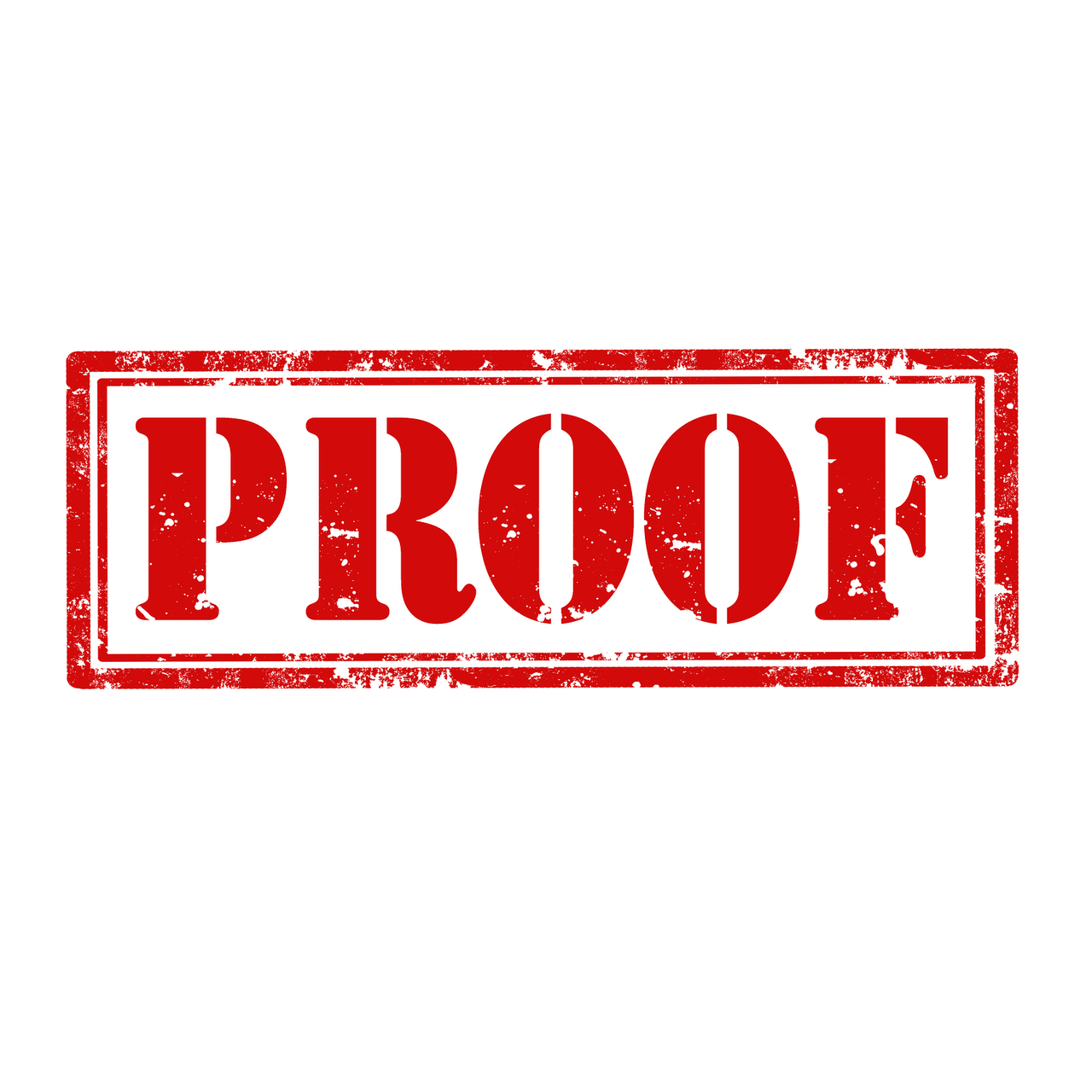When you own a home or a piece of land, having solid evidence that it's truly yours is incredibly important. You see, a "proof of property ownership letter" isn't just a piece of paper; it's a formal statement, or a collection of documents, that stands as undeniable evidence of your legal claim to a property. This kind of document, or rather the collection of items it represents, shows that something is definitely true or definitely exists, just like any strong proof. It provides the necessary facts or pieces of information that clearly demonstrate your connection to the land.
You might need to show this proof for all sorts of reasons. Perhaps you're looking to sell your place, or maybe you're trying to get a loan with your property as collateral. There are times, too, when you might need to settle a family estate, or even deal with local government matters, and having this clear evidence makes everything much smoother. It's the evidence that compels the mind to accept an assertion as true, as a matter of fact.
Knowing exactly what counts as proof, and how to get it, can save you a lot of worry and time. This article will help you understand what these documents are, why they are so valuable, and how you can get them ready. It's about making sure you have the right facts, the right pieces of information, that show your property connection is true, or that it exists.
Table of Contents
- What is a Proof of Property Ownership Letter?
- Key Documents That Serve as Proof
- How to Get Your Proof of Ownership Documents
- Common Situations Where You Need Proof
- Maintaining Your Ownership Records
- Frequently Asked Questions About Property Ownership Proof
- Conclusion
What is a Proof of Property Ownership Letter?
A "proof of property ownership letter" isn't usually one single letter you get in the mail, but rather a collection of official documents that, together, provide undeniable evidence of who legally owns a piece of land or a building. It's the cogency of evidence that compels acceptance by the mind of a truth or a fact, you know? This collection serves as a formal declaration, backed by official records, that you have the rights to your property.
The main idea here is to show that something exists or is true, and these documents do just that for your property. They are the facts or pieces of information that demonstrate your legal hold on the property. This is why these documents are so important in many life situations, as a matter of fact.
Why is This Proof So Important?
Having clear evidence of your property ownership is very important for several reasons. For one thing, it protects your rights as the owner. Without it, someone else could potentially claim your property, or you might have trouble proving your right to use it or sell it. This is not necessarily proof that someone else is wrong, but it certainly shows your position.
It also makes many financial and legal processes much simpler. When you need to borrow money, or transfer the property to someone else, the people involved will ask for this proof. They need to see the evidence that shows something is true or valid. So, too, it helps avoid future disputes and makes sure everyone knows who truly holds the property's title.
Key Documents That Serve as Proof
There are several types of documents that commonly serve as evidence of property ownership. Each one plays a part in building a complete picture of your legal connection to the property. Understanding each one helps you gather what you need, honestly.
The Property Deed: Your Primary Evidence
The property deed is arguably the most important document you have to show ownership. It's a legal paper that transfers the property's title from one person or entity to another. This document literally spells out who the owner is, describing the property in detail, and it's recorded with the local government. It is, in a way, the central piece of evidence.
When you sign a deed, you are accepting the legal transfer of the property. This deed is then usually filed with the county recorder or land registry office, making it a public record. This public record helps to establish a fact or truth, and it shows that something is definitely true or definitely exists.
Title Documents and Abstracts
Beyond the deed itself, you have other title documents. These can include a "title abstract," which is a summarized history of the property's ownership, showing every transfer, lien, or legal action related to it. Think of it as the property's story, told through official records. This kind of information really helps to show the full picture, you know.
A "title insurance policy" also serves as proof, in a way, because it guarantees that the title is clear of certain issues. If there's a problem with the title that wasn't found during the initial search, the policy protects you. This policy is a form of evidence that gives you peace of mind, basically.
Property Tax Statements
While not a direct transfer of ownership, property tax statements are strong supporting evidence. These statements are sent to the legal owner of record by the local tax authority. The fact that you receive and pay these taxes shows that the government recognizes you as the owner. So, too, it's a regular piece of information that shows something exists or is true.
These statements usually list the property's address, the owner's name, and the assessed value. Keeping these current and paid helps to solidify your claim to the property. It's a continuous effort, process, or operation designed to establish or discover a fact or truth, you might say.
Mortgage Documents and Loan Agreements
If you bought your property with a loan, your mortgage documents and loan agreements also serve as a form of proof. These papers show that you are the borrower and that the property is used as collateral for the loan. The lender would not have given you the loan without first verifying your ownership. This is strong evidence that shows something is true or valid.
These documents often include the property's legal description and your name as the borrower, which ties you directly to the property. While they show a debt, they also indirectly confirm your ownership, as you are the one responsible for that property's debt. It's a rather clear connection, honestly.
Survey Reports and Plat Maps
Survey reports and plat maps define the exact boundaries of your property. They are prepared by licensed surveyors and show the precise dimensions, easements, and other features of the land. While they don't transfer ownership, they are crucial for proving the exact extent of what you own. This is a fact or piece of information that shows that something exists or is true, especially regarding boundaries.
These documents are often referenced in deeds and can be essential in resolving boundary disputes with neighbors. They provide a very specific kind of evidence, helping to establish the truth about your property's physical limits. You know, it's about the details.
Utility Bills and Residency Proof
Utility bills, like those for electricity, water, or gas, are generally considered proof of residency rather than direct proof of ownership. However, when combined with other documents, they can support your claim of living at and controlling the property. They are a piece of information that shows something exists or is true, in a supporting role.
For example, if you have a deed in your name and also regularly receive utility bills at that address, it adds to the overall picture of your connection to the property. They are not enough on their own, but they help build a stronger case, pretty much.
Inheritance or Probate Documents
If you inherited your property, the will, probate court orders, or letters of administration are vital proof. These legal documents show that the property was legally transferred to you after the previous owner passed away. They are the official record of the change in ownership through inheritance. This is the evidence that shows something is true or valid in this specific situation.
These papers are recorded with the court and then often with the local land records office, just like a deed. They act as the legal instrument that establishes your right to the property. So, too, they are a very important part of the overall proof.
How to Get Your Proof of Ownership Documents
Getting your hands on these important documents is usually a straightforward process, but it does depend on what you're looking for. Knowing where to go and what to ask for makes it much easier, you know.
Getting Copies of Your Deed or Title
Your property deed is typically recorded at your local county recorder's office, county clerk's office, or land registry office. You can usually request a certified copy of your deed there. There might be a small fee for this. They keep public records, so anyone can look up property deeds, but you'll need to provide the property's address or parcel number. This is an effort, process, or operation designed to establish or discover a fact or truth, actually.
If you used a title company when you bought your home, they often keep copies of your title documents and can help you get what you need. It's often a good first place to check if you're not sure where to start. They have a lot of the information you might need, in fact.
Requesting Property Tax Records
Property tax statements and records can be obtained from your local county tax assessor's office or the county treasurer's office. Many of these offices now have online portals where you can look up your property and print out current or past tax statements. This makes it quite convenient, really.
You'll likely need your property address or parcel identification number to find your records. These records provide evidence sufficient to establish a thing as true, or to produce belief in its truth, regarding your tax payments and ownership. So, too, they are a consistent piece of information.
Obtaining Mortgage Statements
Your mortgage statements are usually sent to you regularly by your mortgage lender. If you need older statements or a complete history, you can contact your lender directly. They often have online accounts where you can access and download these documents. This is generally a pretty simple thing to do.
These statements show your payment history and the outstanding balance, but also confirm your connection to the property as the borrower. It's a fact or piece of information that shows something exists or is true, through your financial commitment.
Finding Survey Records
If you had a survey done when you bought the property, you should have received a copy. If not, you can often get copies from the surveyor who originally performed the work. Sometimes, survey records are also filed with the county recorder's office, especially if they were part of a larger subdivision plat. This is an effort designed to establish or discover a fact or truth, you know.
If there's no existing survey, you might need to hire a licensed surveyor to create a new one. This can be a bit more involved, but it provides very precise evidence of your property's boundaries. It's worth it for the clarity it provides, sometimes.
Common Situations Where You Need Proof
Knowing when and why you might need to present proof of property ownership can help you be prepared. There are many life events and legal requirements that call for these documents. It's always good to be ready, basically.
Selling or Buying Property
When you sell your property, you absolutely need to provide clear proof of ownership to the buyer. This usually involves providing a clear deed and ensuring the title is free of any claims or liens. The buyer's lender and title company will insist on this. This is the evidence that shows something is true or valid for a transaction.
Similarly, when you buy a property, you receive the deed and other title documents, which then become your proof of ownership. This process is all about making sure the transfer of ownership is legally sound and fully documented. So, too, it's a very important step.
Applying for Loans or Refinancing
If you want to take out a home equity loan, a second mortgage, or refinance your existing mortgage, lenders will require proof that you own the property. They need to know that the collateral for the loan is truly yours. They need to see the facts or pieces of information that show that something exists or is true.
This typically means providing your deed, and the lender will conduct their own title search to ensure there are no other claims on the property. It's a standard part of their process to protect their investment, naturally.
Resolving Boundary Disputes
Disagreements with neighbors about property lines can happen. In these cases, your deed, survey reports, and plat maps become incredibly important. They provide the precise legal descriptions and measurements that define where your property ends and your neighbor's begins. This is the degree of evidence which convinces the mind of any truth or fact, and produces belief.
Having these documents readily available can help settle disputes without needing to go to court, or they can serve as strong evidence if legal action becomes necessary. It helps to show that something is definitely true or definitely exists, regarding those lines.
Dealing with Inheritance or Estate Planning
When someone passes away, their property needs to be transferred to their heirs. This process, called probate, requires clear proof of the deceased person's ownership and then proof of the legal transfer to the new owner. Wills, death certificates, and court orders are all part of this. This is the evidence that shows something is true or valid in a legal sense.
For your own estate planning, having your property ownership documents organized and accessible makes it much easier for your loved ones to handle your affairs later on. It's a thoughtful way to prepare, really.
Insurance Claims and Property Damage
If your property suffers damage and you need to file an insurance claim, your insurance company might ask for proof of ownership. This helps them confirm that you are the rightful policyholder and that the property is indeed yours to insure. They need to see the facts or pieces of information that show that something exists or is true before they pay out.
Having your deed or other title documents ready can speed up the claims process and avoid any delays. It's a small step that can make a big difference when you're dealing with a difficult situation, you know.
Maintaining Your Ownership Records
Keeping your property ownership documents safe and organized is a really good idea. Think about having a fireproof safe or a secure digital backup for copies of your deed, title insurance policy, and other important papers. This helps protect them from loss or damage. It's a simple step that provides a lot of security, actually.
It's also a good habit to review your property records every few years, especially if there have been any changes to your property, like additions or boundary adjustments. Staying current with your documents means you're always ready if you need to show proof of property ownership letter. Learn more about property records on our site. You can also link to this page for more information about title insurance.
Frequently Asked Questions About Property Ownership Proof
People often have similar questions about showing they own their property. Here are some common ones that come up, very often.
What documents prove property ownership?
The most important document is your property deed, which is recorded with the county. Other strong pieces of evidence include title insurance policies, property tax statements, and mortgage documents. These are all facts or pieces of information that show that something exists or is true, regarding your ownership.
Can a utility bill prove property ownership?
A utility bill typically shows proof of residency, not direct ownership. While it confirms you live at an address, it doesn't legally establish you as the property owner. It can support your claim when combined with other strong documents, but it's not enough on its own, basically.
How long does it take to get proof of ownership?
Getting a copy of your recorded deed from the county recorder's office can often be done the same day or within a few business days, depending on their procedures. Other documents, like older mortgage statements or new surveys, might take a bit longer. It depends on what you need, you know.
Conclusion
Having clear and accessible proof of property ownership is absolutely essential for any property owner. These documents, like your deed, tax statements, and title records, are the evidence that shows something is true or valid about your property rights. They protect your interests and make many legal and financial dealings much smoother. By understanding what these documents are and how to keep them safe, you're taking a very important step in protecting your biggest assets. Make sure you know where your important papers are and consider keeping them updated, because being prepared just makes life easier.



